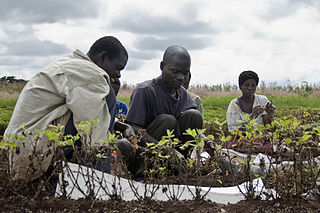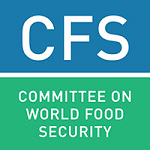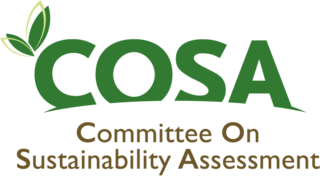Related Research Articles

Subsistence agriculture occurs when farmers grow crops to meet the needs of themselves and their families on smallholdings. Subsistence agriculturalists target farm output for survival and for mostly local requirements. Planting decisions occur principally with an eye toward what the family will need during the coming year, and only secondarily toward market prices. Tony Waters, a professor of sociology, defines "subsistence peasants" as "people who grow what they eat, build their own houses, and live without regularly making purchases in the marketplace".

CGIAR is a global partnership that unites international organizations engaged in research about food security. CGIAR research aims to reduce rural poverty, increase food security, improve human health and nutrition, and sustainable management of natural resources.

The International Crops Research Institute for the Semi-Arid Tropics (ICRISAT) is an international organisation which conducts agricultural research for rural development, headquartered in Patancheru, Hyderabad, Telangana, India, with several regional centres and research stations . It was founded in 1972 by a consortium of organisations convened by the Ford- and the Rockefeller- foundations. Its charter was signed by the FAO and the UNDP.

Strive Masiyiwa is a London-based Zimbabwean billionaire businessman and philanthropist. He is the founder and executive chairman of international technology groups Econet Global and Cassava Technologies.

A smallholding or smallholder is a small farm operating under a small-scale agriculture model. Definitions vary widely for what constitutes a smallholder or small-scale farm, including factors such as size, food production technique or technology, involvement of family in labor and economic impact. Smallholdings are usually farms supporting a single family with a mixture of cash crops and subsistence farming. As a country becomes more affluent, smallholdings may not be self-sufficient, but may be valued for the rural lifestyle. As the sustainable food and local food movements grow in affluent countries, some of these smallholdings are gaining increased economic viability. There are an estimated 500 million smallholder farms in developing countries of the world alone, supporting almost two billion people.

Agriculture is a sector of the Nigerian economy, accounting for up to 35% of total employment in 2020. According to the FAO, agriculture remains the foundation of the Nigerian economy, providing livelihoods for most Nigerians and generating millions of jobs. Along with crude oil, Nigeria relies on the agricultural products it exports to generate most of its national revenue. The agricultural sector in Nigeria comprises four sub-sectors: crop production, livestock, forestry, and fishing.
Sam Dryden was a thought leader and advocate for food and nutrition security, with a particular focus on small-holder farmer led agricultural development in Africa and Asia. Lately Dryden was a Fellow at Imperial College, working on a project to promote digital technologies that can catalyse sustainable agricultural transformation across the food system in Africa.

The main economic products of Malawi are tobacco, tea, cotton, groundnuts, sugar and coffee. These have been among the main cash crops for the last century, but tobacco has become increasingly predominant in the last quarter-century, with a production in 2011 of 175,000 tonnes. Over the last century, tea and groundnuts have increased in relative importance while cotton has decreased. The main food crops are maize, cassava, sweet potatoes, sorghum, bananas, rice, and Irish potatoes and cattle, sheep and goats are raised. The main industries deal with agricultural processing of tobacco, tea and sugar and timber products. The industrial production growth rate is estimated at 10% (2009).
One Acre Fund is a social enterprise that supplies smallholder farmers in East Africa with asset-based financing and agriculture training services to reduce hunger and poverty. Headquartered in Kakamega, Kenya, the organization works with farmers in rural villages throughout Kenya, Rwanda, Burundi, Tanzania, Uganda, Malawi, Nigeria, Zambia, and Ethiopia.

The Committee on World Food Security (CFS) was established in 1974 as an intergovernmental body to serve as a forum in the United Nations System for review and follow-up of policies concerning world food security, including any and all production, physical, and economic access to food. It was reformed in 2009 to become a multi stakeholder committee. SIRPI constitutes a key role in achieving the UN's SDG No.2.

Trees for the Future is a Maryland-based nonprofit organization founded on August 14, 1989, that trains farmers around the world in agroforestry and sustainable land use.

The Committee on Sustainability Assessment (COSA) is a global consortium of development institutions that work collaboratively to advance sustainability learning with systematic and science-based measurement. COSA applies a pragmatic and collective approach for using scientific methods to develop indicators, tools, and technologies to measure the distinct social, environmental, and economic impacts and are applied in performance monitoring, evaluation, return on investment (ROI) calculation, and impact assessment. COSA has a public mission to open its scientific methods and metrics up to widespread use.
Mozambique has a variety of regional cropping patterns; agro-climatic zones range from arid and semi-arid to the sub-humid zones to the humid highlands. The most fertile areas are in the northern and central provinces, which have high agro-ecological potential and generally produce agricultural surpluses. Southern provinces have poorer soils and scarce rainfall, and are subject to recurrent droughts and floods.
Ghana'sMinistry of Food and Agriculture (MOFA) is the government agency responsible for the development and growth of agriculture in the country. The jurisdiction does not cover the cocoa, coffee, or forestry sectors. The primary organisation and main area of the presidential administration of Ghana is the nation's Ministry of Food and Agriculture (MOFA), which is in charge of creating and carrying out policies and plans for the agricultural sector within the framework of an efficient national socio-economic development and prosperity agenda. The Ministry's plans and programmes are created, coordinated, and put into effect using frameworks for policy and strategy using a sector-wide approach. The Food and Agriculture Sector Development Policy II and the Medium Term Agriculture Sector Investment Plan were both developed with the aid of MOFA in relation to this.

The African Forum for Agricultural Advisory Services (AFAAS), is an African organization for strengthening Agricultural Extension and Advisory Services (AEAS) in Africa. It operates within the framework of the Comprehensive Africa Agriculture Development Programme (CAADP), a venture of the African Union in the New Partnership for Africa's Development (NEPAD). AFAAS is an autonomous subsidiary of the Forum for Agricultural Research in Africa (FARA).
Lindiwe Sibanda Majele (born 1963) is a Zimbabwean professor, scientist, policy advocate and influencer on food systems. She currently serves as director and chair of the ARUA Centre of Excellence in Sustainable Food Systems (ARUA-SFS) at the University of Pretoria in Pretoria, South Africa as well as founder and managing director of Linds Agricultural Services Pvt Ltd. in Harare, Zimbabwe. She is currently a board member of Nestlé where she is also a member of the Sustainability Committee.

Agnes Matilda Kalibata is a Rwandan agricultural scientist and policymaker, and president of the Alliance for a Green Revolution in Africa (AGRA). She served as Rwanda's minister of agriculture and animal resources from 2008 to 2014 and began her tenure as president of the Alliance for a Green Revolution in Africa (AGRA) in 2014.
Digital agriculture, sometimes known as smart farming or e-agriculture, is tools that digitally collect, store, analyze, and share electronic data and/or information in agriculture. The Food and Agriculture Organization of the United Nations has described the digitalization process of agriculture as the digital agricultural revolution. Other definitions, such as those from the United Nations Project Breakthrough, Cornell University, and Purdue University, also emphasize the role of digital technology in the optimization of food systems.

Ruth Khasaya Oniang'o is a Kenyan Professor of Nutrition and a former member of Parliament. She created Rural Outreach Africa (ROA) to empower smallholder farmers to address malnutrition, she oversees her country's nutrition policy, and she has been on the following Boards: Centre for Agriculture and Bioscience International, Board Member KILIMO TRUST , Food Security and Sustainable Development Division of the Economic Commission for Africa (ECA), Institute for Policy Research Analysis (IPAR), Former Board Chair, Sasakawa Africa Association (SAA) , International Centre for Soil Fertility and Agricultural Development (IFDC), USA, Nutrition Third World Board, based in Belgium and supports Third World Nutrition Research , Member of Trustees for the International Rice Research Institute, CGIAR Centre, Project Advisory Committee of the HarvestPlus, and CGIAR Challenge Program seeking to enhance bioavailability of nutrients from food crops using conventional mean.
A number of movements seek to expand the practice of agroecology in West Africa. Agroecology is a scientific discipline, movement and practice that integrates ecology in agriculture with strong emphasis on diversification, food sovereignty, energy efficiency and sustainability. Agroecological practices apply the systems and knowledge that traditional farmers in the region have developed and inherited. The agroecological social movement empowers smallholder farmers that hold the knowledge of indigenous farming systems, however are recently engulfed by larger farms or are migrating to urban areas, looking for better paying jobs.
References
- ↑ "Alliance for a Green Revolution in Africa". The Rockefeller Foundation. Retrieved 2021-06-15.
- ↑ "Africa seeks the cooperation of Latin America and the Caribbean in the areas of export development, soil recovery and reforestation". IICA.INT. Retrieved 2021-06-15.
- 1 2 "New Agriculturist: News brief - Kofi Annan leads Africa's new 'Green Revolution'". www.new-ag.info. Retrieved 2021-05-06.
- ↑ "The farmers' voice in agricultural development". Alliance magazine. Retrieved 2021-05-06.
- ↑ "Strive Masiyiwa - Chair Emeritus". Nutrition International. Retrieved 2021-05-06.
- ↑ "Ex-Ethiopian PM on why Rwanda was named new home for continental agric body". The New Times | Rwanda. 2019-11-26. Retrieved 2021-05-06.
- ↑ "MESSAGE FROM OUR PRESIDENT – AGRA Annual Report 2019". Archived from the original on 2021-05-06. Retrieved 2021-05-06.
- ↑ "Leadership". United Nations. Retrieved 2021-05-06.
- ↑ "IBRAF is going to develop a leadership program in partnership with the Alliance for the Green Revolution in Africa - IBRAF | Brazil Africa Institute | Instituto Brasil África". 2020-01-30. Retrieved 2021-05-06.
- ↑ "AGRF Virtual Summit 2020". AGRF. Archived from the original on 2021-01-19. Retrieved 2021-05-11.
- ↑ "GAIN and AGRA to partner for food and nutrition security". Global Alliance for Improved Nutrition (GAIN). Retrieved 2021-05-28.
- ↑ "Focus Countries". AGRA. Retrieved 2021-05-28.
- ↑ Kim, Sung Kyu (2020-10-13). "Does the African Green Revolution include smallholder farmers?". STEPS Centre. Retrieved 2021-06-09.
- 1 2 "AGRA half-year 2020 M&E Progress Report" (PDF). United States Agency for International Development . Archived (PDF) from the original on 2021-06-09. Retrieved 2021-06-09.
- ↑ "Microsoft collaborates with AGRA to digitize agriculture in 11 African countries". Africa Business Communities. Retrieved 2021-06-21.
- ↑ "New partnership inked with AGRA to boost improved technology uptake in Africa's agriculture – ICRISAT". www.icrisat.org. Retrieved 2021-06-21.
- ↑ Mboga, Jael. "AGRA, Microsoft in new deal to solve agriculture problems using technology - FarmKenya Initiative". Farm Kenya Initiative. Retrieved 2021-06-21.
- ↑ Akinyi, Maureen. "AGRA financing model sees 230,000 farmers access loans - FarmKenya Initiative". Farm Kenya Initiative. Retrieved 2021-06-21.
- ↑ "NIRSAL: CBN, AGRA new project to create affordable loans for small holder farmers". Vanguard News. 2011-07-24. Retrieved 2021-06-21.[ permanent dead link ]
- ↑ "African Green Revolution – Theme 3". Future agricultures. Retrieved 2021-06-24.
- ↑ "Malabo Declaration on Accelerated Agricultural Growth | AUDA-NEPAD". www.nepad.org. Retrieved 2021-06-24.
- ↑ "Green Revolution in Africa Has Sown Agricultural Success, Report Finds". Philanthropy News Digest. Archived from the original on 2016-09-08.
- ↑ "Good news for cassava as new varieties to combat deadly viral diseases are officially released in Tanzania". Newstime Africa. 24 January 2012. Retrieved 5 February 2012.
- ↑ Hultman, Tami (24 January 2012). "Africa: Aid Can Spur 'Historic Progress' - Bill Gates". AllAfrica. Retrieved 5 February 2012.
- ↑ Austin-Evelyn, Katherine (16 June 2011). "The 'keepers of seed': The impact of the 'Green Revolution' in Africa on female farmers". Consultancy Africa Intelligence. Archived from the original on 3 December 2013. Retrieved 2 February 2012.
- ↑ Melissa Moore (2011). Anuradha Mittal (ed.). Voices From Africa (PDF). Oakland: Oakland Institute. Retrieved 2 February 2012.
- ↑ Holt-Giménez, Eric. "Ten Reasons Why AGRA Will not Solve Poverty and Hunger in Africa" (PDF). foodfirst.org. Archived (PDF) from the original on 2019-06-19. Retrieved 21 February 2021.
- ↑ Sigei, Julius (22 January 2022). "AGRA's Green Revolution Has Failed, Critics Say". The Elephant. Retrieved 2 February 2022.
- ↑ "Africa Agriculture Status Report 2020 Launched". massp.ifpri.info. Archived from the original on 2021-07-09. Retrieved 2021-07-09.
- ↑ "Food Security Monitor". AGRA. Retrieved 2021-07-09.
- ↑ "Annual Reports". AGRA. Retrieved 2021-07-09.